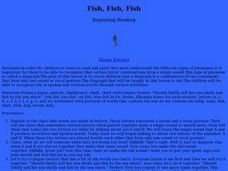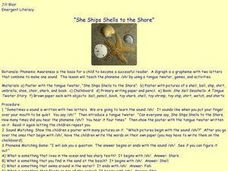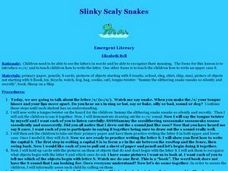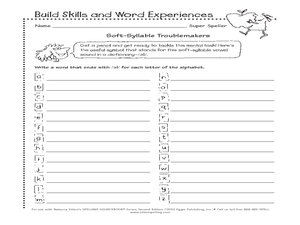Curated OER
OWL Makes Reading Fun!
Students study the sound the 'ow' makes by picking out words on a poster that contain the sound and by listening to 'Mr. Brown Can Moo Can You?' They raise their hands each time they hear a word with the 'ow' sound. Next, they find...
Curated OER
Choo Choo Train
First graders study the sound and spelling of the /ch/ digraph. They repeat words containing the "ch" before making words using their Elkonin letterboxes and letter manipulatives. Next, they clap each time they hear the "ch" digraph...
Curated OER
Sound Stretching
In this basic vowel and consonant blending lesson, young learners are shown how to "blend" the sounds of different letters together in order to make a word. Simple words such as, "sun," "moon," and, "ant," are used in a whole-class setting.
Curated OER
A Tisket-A-Tasket, Let?s Make a Flower Basket!!!
First graders practice blending words with the phonemes /i/ and /e/. Working with a specific groups of letters, 1st graders create words using the vowels i and e. they decode those words and read them repeatedly to increase fluency.
Curated OER
Fish, Fish, Fish
Young scholars identify the digraph /sh/ in written and spoken language. After a brief discussion the independent and combined sounds of the phonemes /s/ and /h/ students practice identifying initial and final placement of the new...
Curated OER
Chirping Chickens
First graders study the /ch/ diagraph using a tongue twister which they listen to and recite. Next, they use Elkonin letterboxes to make words with the /ch/diagraph. They listen to Jean Luc-Fromental's, "Broadway Chicken" twice, the...
Curated OER
Shhh...the Baby is Sleeping
First graders identify the digraph /sh/ in written and spoken language. After a brief discussion of the independent and combined sounds of the phonemes /s/ and /h/ students practice identifying initial and final placement of the new...
Curated OER
Don't Wake Mama
Students identify the digraph /sh/ in written and spoken language. After a brief discussion of the independent and combined sounds of the phonemes /s/ and /h/ students practice identifying initial and final placement of the new digraph...
Curated OER
Shelly's Ship is Coming to Shore!
Young scholars identify the digraph /sh/ in written and spoken language. After a brief discussion the independent and combined sounds of the phonemes /s/ and /h/ students practice identifying initial and final placement of the new...
Curated OER
phoneme awareness
Students focus on the sound of the /ch/ digraph before recognizing it in both written and spoken words. They study the poster that says "Chugga Chugga Choo Choo!" to find they /ch/ phonemes. They write the letters before identifying...
Curated OER
Baby Sally is Upset Again!
Students, assessing how to read and write, join together grapheme's and the phonemes that make up words. They practice recognizing in oral and written form the vowel /a/. The book, "Matt and Rags," is introduced to the students in this...
Curated OER
O No!
First graders distinguish between short vowel a and long vowel O. They are introduced to the vowel-consonant-e pattern that changes short vowel sounds into long vowel sounds. They practice spelling words with the vowel-consonant-e pattern.
Curated OER
She Ships Shells to the Shore
First graders identify the digraph /sh/ in written and spoken language. After a brief discussion the independent and combined sounds of the phonemes /s/ and /h/ students practice identifying initial and final placement of the new digraph...
Curated OER
Shiny Shells on the Shore
Young scholars investigate how: A single phoneme, which is a vocal gesture in spoken words, can be represented by more than one grapheme. Also how a digraph is the combination of two letters that make one sound (there are both vowel and...
Curated OER
The Whining Child
Students recognize the short vowel u in written and spoken language. Through matching and listening activities, they discriminate the vowel sound /u/ from other phonemes. Students identify the phoneme and letter in words and pictures.
Curated OER
Mmm, Mmm ... Good!
Help primary students learn the /m/ sound. As they listen as the teacher introduces the "Secret Code" of language they will practice the /m/ sound by rubbing their tummies as if eating something good. They also practice hearing and...
Curated OER
Cat on the Mat Guided Reading Lesson
Young learners participate in a guided reading lesson. They will read the book Cat on the Mat by Brian Wildsmith. The teacher helps provide the group with reading strategies, and provides more one-on-one support during independent...
Houghton Mifflin Harcourt
Silly Stories: Extra Support Lessons (Theme 1)
Kids who need extra support with the concepts in the Houghton Mifflin Harcourt thematic unit on silly stories, will benefit from this packet packed with skill builders, activities, exercises, and practice sets.
Curated OER
Short Vowels: Read and Color
In this short vowel worksheet, students read words inside of pictures that have a short vowel sound, then use a color key to color correctly. Worksheet contains links to additional activities.
Curated OER
Slinky Scaly Snakes
Students examine the sound of the letter S and write the upper case S. As a class, they repeat a tongue twister with the letter S, then observe and demonstrate how to write the letter S. Students then view a variety of objects and...
Curated OER
Spelling Strategies for Success
Students identify the meaning of the suffix "er" in given words and sort according to meaning. Students pair up for proofing of work, checking for correct sorting of words in categories of: no suffix, suffix that means "more," and...
Curated OER
Spelling Success: ends with el
Fourth graders come up with a word that ends with the "el" sound for every letter of the alphabet. In this spelling lesson plan, 4th graders use all 26 letters to come up with these words.
Curated OER
Do They Rhyme?
Students pick out words that rhyme. For this lesson on rhyme, students listen to the teacher read the poem "My Robot Does My Homework" by Kenn Nesbitt and pick out words that rhyme.
Curated OER
Ruby's Whistle
Young scholars investigate the children's book "Ruby's Whistle" in order to practice skills of reading comprehension. They make connections with the text while reading that include sight word recognition, putting together contractions,...

























